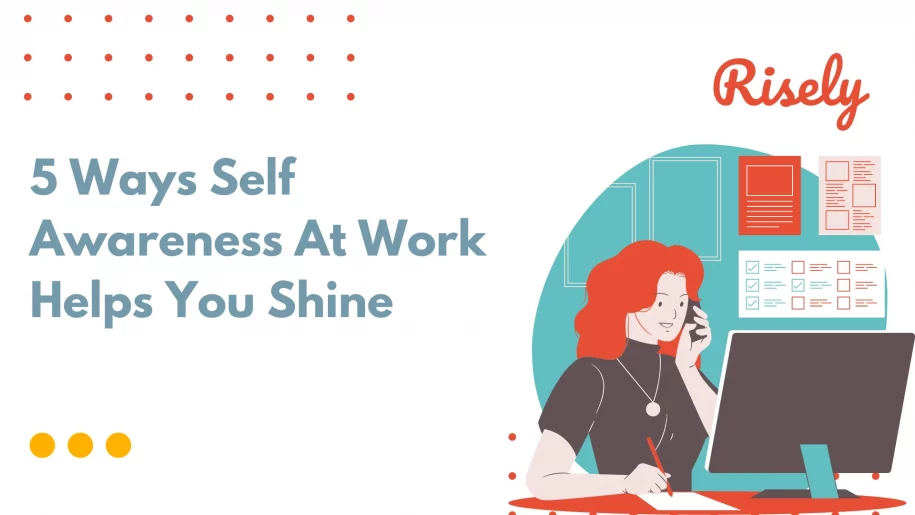5 Ways Self Awareness At Work Helps You Shine
If you are a manager, you would want to be sure of yourself. After all, a good people leader can embrace their authentic selves confidently and motivate others to do the same. Before jumping into the chaos of knowing and managing people, the journey begins with the self. That’s where self-awareness comes in. Self-awareness is a fundamental quality that can significantly impact your success in the workplace. It involves understanding and managing your emotions, thoughts, motivations, and behaviors. This blog will explore the importance of self-awareness in the workplace and how it can help you shine. Whether you are a manager, leader, or aspiring professional, self-awareness can unlock your full potential and help you shine in your career.What is self awareness at work?
Self-awareness is a critical ability that every human develops around five years of age. At first, infants do not see themselves as distinct people; they are mere extensions of their primary caregivers in their minds. But over time, the notion of self grows and shapes people’s understanding of who they are. Self-awareness in the workplace refers to recognizing and understanding your thoughts, emotions, strengths, weaknesses, and behaviors. It involves introspection and self-reflection, allowing you to gain insights into your inner world and how it influences your professional interactions. According to organizational psychologists, self-awareness is the foundation of effective leadership and can greatly impact one’s work performance. It helps you exercise social control and make conscious decisions that align with your values and goals. Studies have shown that developing self-awareness can help managers and leaders build better relationships, enabling improved performance.What are the different aspects of self-awareness?
- Emotional Awareness: Recognizing and understanding your emotions, including their triggers, intensity, and impact on behavior. Emotional awareness allows you to identify and label your feelings accurately.
- Behavioral Awareness: Behavioral awareness entails recognizing how your actions, habits, and communication style impact you and others. It involves monitoring and adjusting behaviors to align with personal and professional goals.
- Social Awareness: Social awareness involves understanding the thoughts, feelings, and perspectives of others, as well as the dynamics of social interactions and relationships. It allows you to empathize with others and navigate social situations effectively.
- Cultural Awareness: Cultural awareness entails recognizing and respecting the diversity of cultural backgrounds, norms, and perspectives around you. It involves being mindful of how culture influences perceptions, behaviors, and interactions.
- Body Awareness: Body awareness involves recognizing and understanding your body’s physical sensations, cues, and signals. It includes awareness of posture, gestures, facial expressions, and the impact of physical well-being on emotions and behavior.
Why should you care about self-awareness at work?
- Enhanced Relationships: Self-awareness enables effective communication, understanding of colleagues’ perspectives, and empathy, fostering stronger and more meaningful relationships in the workplace.
- Improved Decision-Making: Self-aware managers can make choices that align with their values and goals by recognizing their biases, regulating their emotions, and examining situations from various perspectives, resulting in more informed and rational decisions.
- Better Stakeholder Management: Self-awareness contributes to better interpersonal relationships by allowing one to understand one’s own emotions, strengths, and weaknesses. This understanding forms the basis of strong relationships and effective collaboration with your team members.
- Effective Communication and Collaboration: Self-aware managers promote effective communication and collaboration within their teams by providing and receiving constructive feedback and fostering an environment of open communication, mutual respect, and trust.
- Leadership Effectiveness: Self-awareness is crucial for effective leadership. It enables managers to understand their own strengths and weaknesses, lead by example, and create a positive work environment that fosters growth and development, thereby enhancing their influence and effectiveness as leaders.
Other Interesting Reads
How to enhance self-awareness at work?
Self-awareness is essential for managers and leaders who want to excel. It requires a commitment to personal growth and a willingness to explore your strengths and weaknesses. Here are a few strategies for managers to build self-awareness at work:Feedback
Feedback plays a crucial role in cultivating self-awareness. Constructive feedback from colleagues, supervisors, and team members can provide valuable insights into your strengths, weaknesses, and blind spots. It helps you identify areas for improvement and highlights areas where you excel. To get started:- Offer yourself feedback
- Seek feedback from others, this includes your team members as well as managers
Self-Reflection
Self-reflection is a powerful technique for developing self-awareness and improving leadership skills. This reflective practice allows you to identify patterns, strengths, weaknesses, and areas for improvement. This provides a starting point for self-discovery and guides your self-improvement journey. For starters, here are a few self-awareness questions you can use to understand yourself better:- What are my greatest strengths as a manager, and how do they contribute to the success of my team and organization? How can I leverage these strengths more effectively?
- What are my biggest challenges or areas for improvement as a manager? How can I address these challenges and develop new skills or competencies to overcome them?
- How do I communicate with my team members, both verbally and non-verbally? Am I mindful of my tone, body language, and facial expressions, and how they may impact others?
- What values and principles guide my decision-making as a manager? Are there any instances where my actions may not align with these values, and if so, how can I address these discrepancies?
- How do I prioritize my time and tasks as a manager? Am I able to delegate effectively and focus on high-priority activities, or do I find myself overwhelmed by competing demands?
- What is my leadership style, and how does it impact my team’s performance and morale? Am I adaptable and open to feedback, or do I tend to stick to a rigid approach?
Coaching and Mentoring
Coaching and mentoring can play a significant role in enhancing self-awareness. Working with a coach or mentor provides a supportive and structured environment for self-reflection and personal growth. A coach or mentor can ask thought-provoking questions, provide feedback, and offer guidance on how to improve self-awareness. They can help you identify blind spots, examine different perspectives, and develop strategies for enhancing your self-awareness in the workplace. Through regular coaching or mentoring sessions, you can gain valuable insights, set goals, and take actionable steps toward becoming more self-aware. Read more: Essential Guide to Effective Leadership CoachingBuilding self-awareness at work: Free resources for managers
Did you know, according to research by Eurich, a staggering 95% of people believe they are self-aware? The reality, however, is quite different. Only about 10-15% of the survey respondents were truly self-aware. This stark contrast highlights a significant gap between self-awareness and the perception of self-awareness.Warm up to becoming a self-aware manager
Let’s start with a short self-awareness assessment to clarify where you stand. Instead of one-word answers, think about these questions to unravel the vital areas that form your personality. As the next step, you can note key points and set goals about what you would ideally want to be.- What are my core values and beliefs, and do they guide my decision-making and actions in the workplace?
- How do I typically respond to positive and negative feedback from colleagues, supervisors, and clients?
- What are my primary strengths and weaknesses in the workplace, and how do they impact my performance and interactions with others?
- Do I set realistic goals for myself and stay focused and motivated to achieve them, or do I frequently procrastinate or lose sight of my objectives?
- How do I handle setbacks, failures, and criticism? Do I tend to dwell on them, or can I bounce back and learn from them?
- Do I have a clear understanding of my long-term career goals and aspirations? Am I actively taking steps to work towards them, or do I feel directionless and unsure of my path?
How well do you score on the key skills needed for self-awareness?
As much as self-awareness at work is essential, we can also understand it as a mix of critical managerial skills. Leadership skills that contribute to self-awareness encompass emotional intelligence, communication abilities, and reflective practices. Risely offers self-assessments of leadership skills to help you in this area; check out the essentials from the list below for free:Active Listening
Effective listening skills are essential for self-awareness. Managers who actively listen to their team members can gain valuable insights into their perspectives, concerns, and feedback, which can enhance their self-awareness by broadening their understanding of different viewpoints. Assess your active listening skills for free now!Feedback Receptivity
Being open to feedback from colleagues, supervisors, and direct reports is a key aspect of self-awareness. Managers who actively seek and accept feedback can gain valuable insights into their strengths, weaknesses, and areas for improvement, contributing to their ongoing self-awareness and professional growth. Assess your constructive feedback skills for free now!Conflict Resolution Skills
Effective conflict management requires a high level of self-awareness. Managers who understand their conflict styles, triggers, and biases can navigate conflicts with greater emotional intelligence and objectivity, leading to more constructive resolutions and improved relationships with team members. Assess your conflict resolution skills for free now!Conclusion
In conclusion, self-awareness at work is not just a buzzword; it’s a powerful tool that can transform your professional journey. By understanding your strengths, weaknesses, and impact on others, you can make informed decisions, nurture positive relationships, and enhance your leadership skills. Embracing self-awareness leads to improved decision-making, stronger team dynamics, and more significant leadership influence. Remember, self-awareness is not a destination but a continuous journey toward personal and professional growth. Start today and watch yourself shine brighter than ever before in your career.Get AI coaching for managerial success.
Start a free trial with Merlin, Risely’ AI buddy for managers, and discover your true potential.
Other Related Blogs
Breaking Fixed Mindsets in Managers with Rick Carson
Breaking Fixed Mindsets in Managers with Rick Carson A manager needs to think of growth to chart that path. That’s why Carol Dweck’s philosophy of a growth mindset is highly…
How to build and retain high performing employees? | Laletha Nithiyanandan
How to build and retain high performing employees? | Laletha Nithiyanandan Are you really an HR if you have not spent hours chasing the ideal high performing employees for your…
5 Steps to Get Started with GROW Coaching Model
5 Steps to Get Started with GROW Coaching Model As a coach, you strive to empower your clients to reach their full potential. Sometimes, however, knowing where to start or…
Learning And Development 70 20 10 Plans (Free Template)
Learning And Development 70 20 10 Plans (Free Template) Is classroom training enough? Or can on-the-job training do the job? Neither can do justice to an organization’s learning and development…


